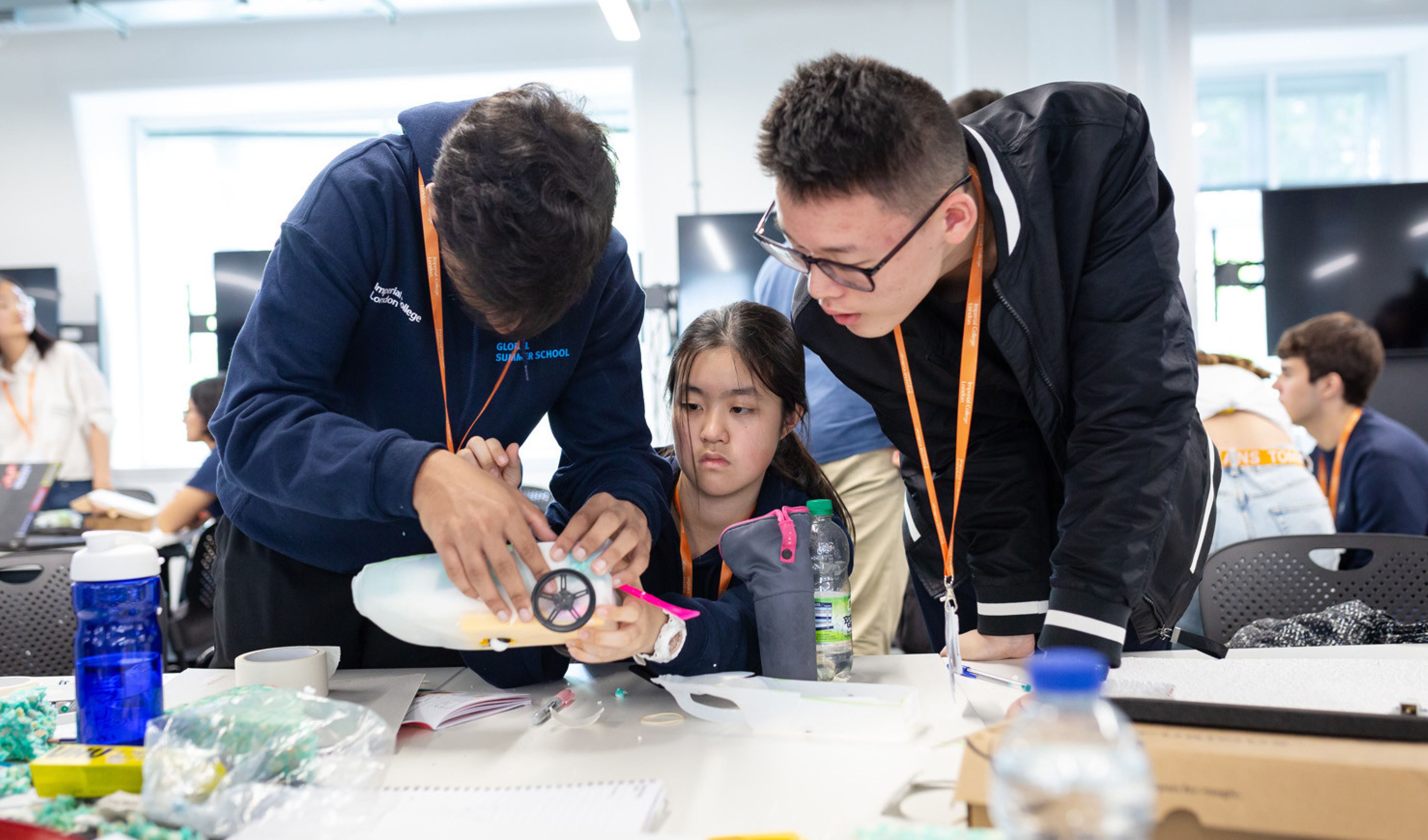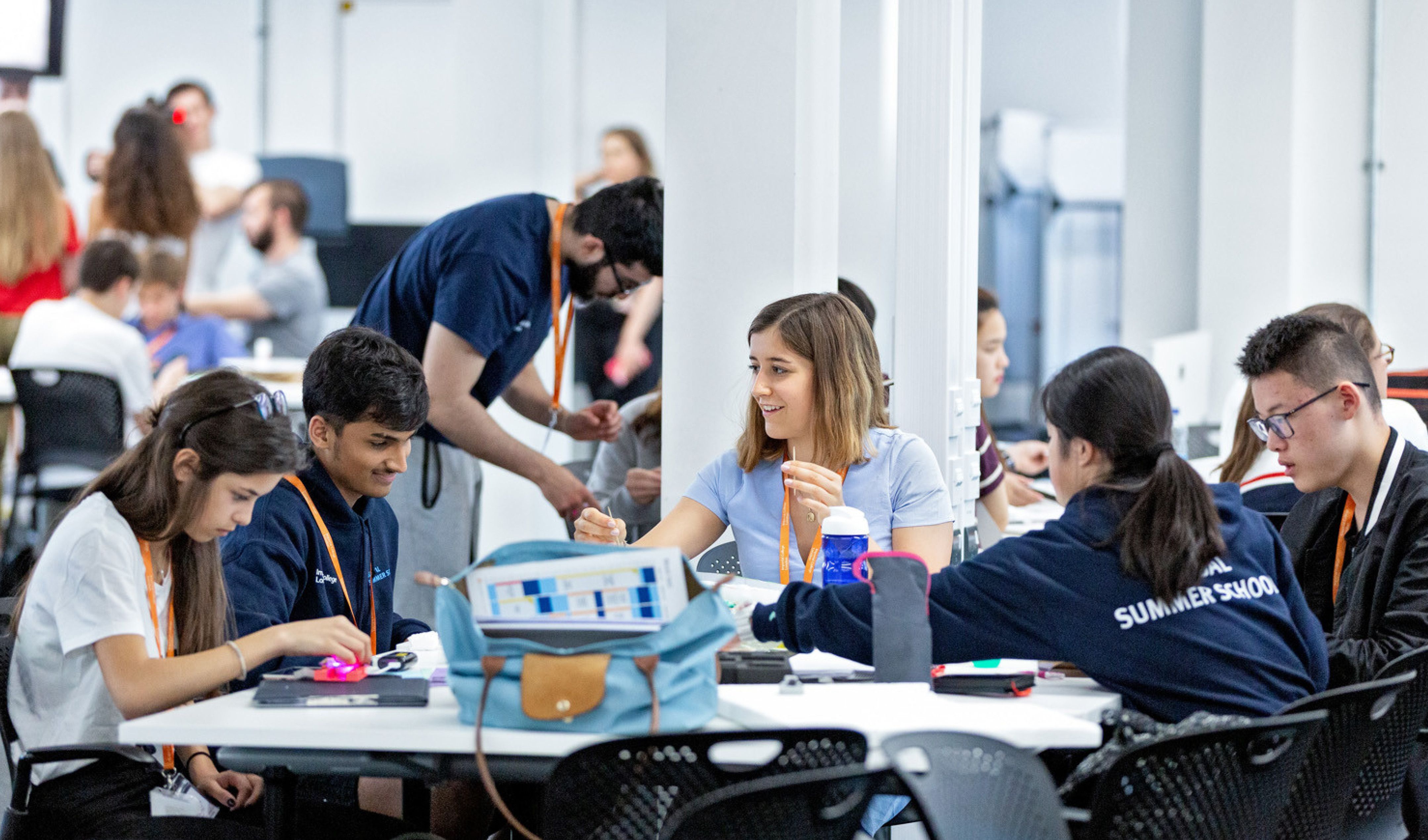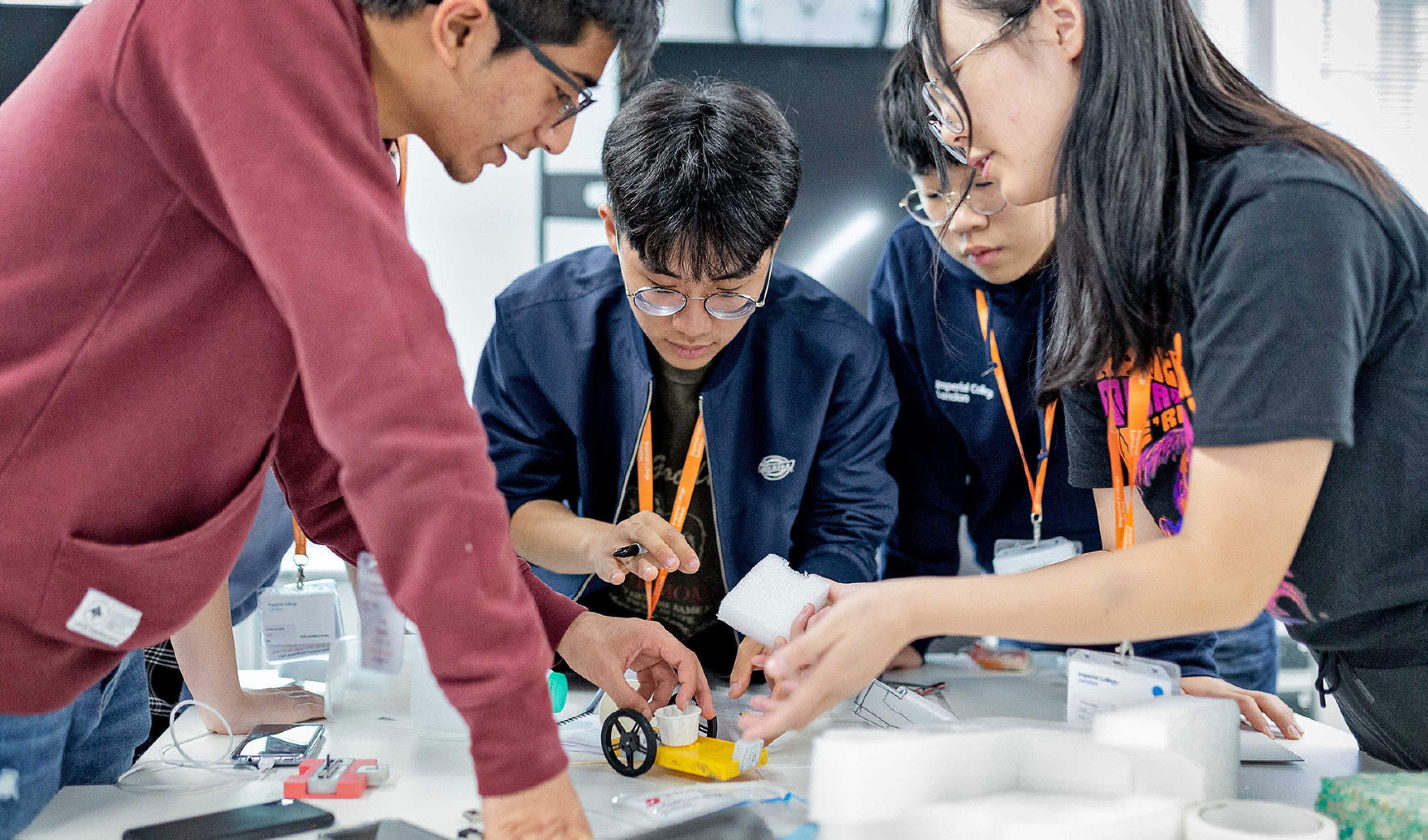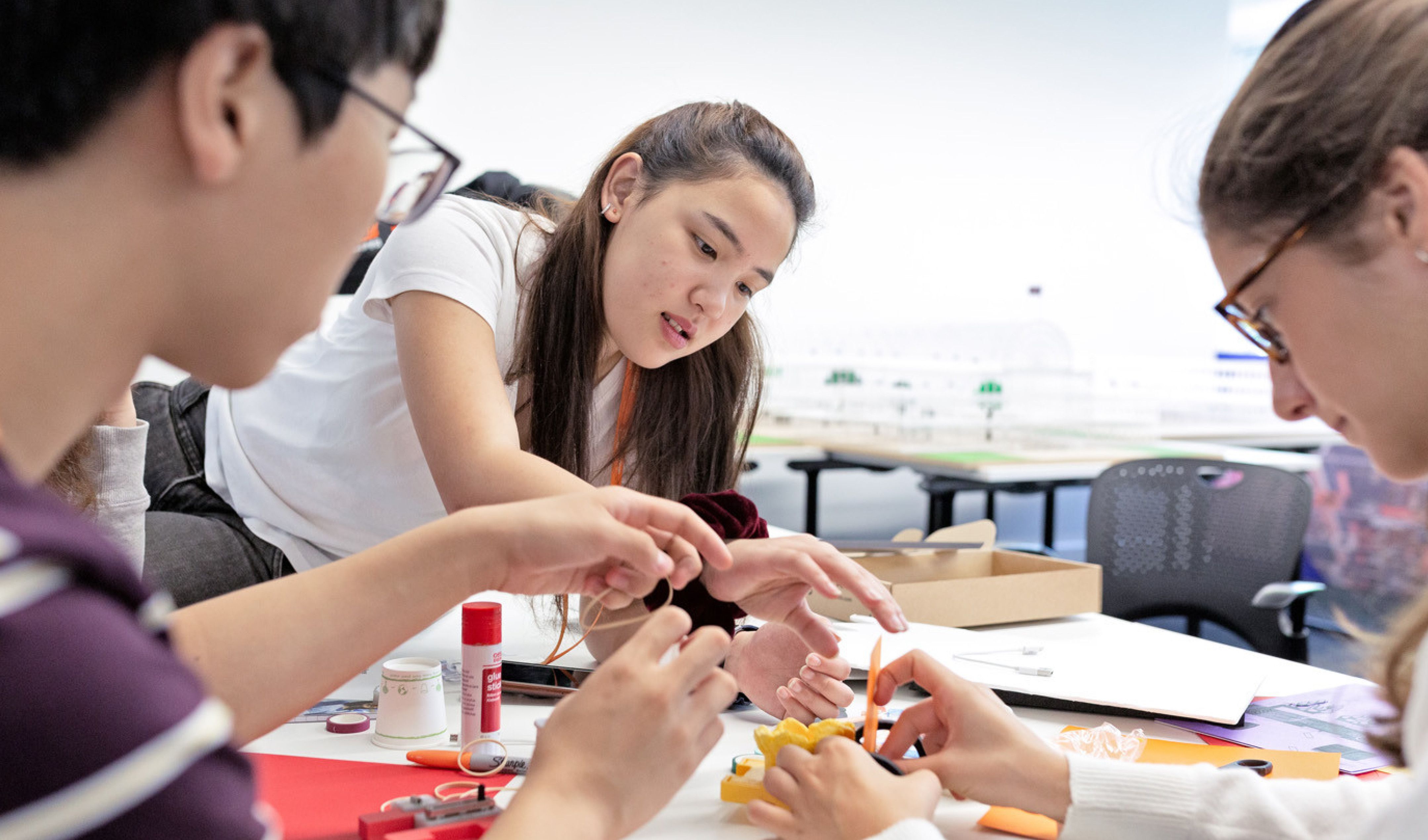This highly interactive subject will expose you to a variety of engineering disciplines. Through specialist workshops, lectures and seminars, you will develop key skills and work in groups to find solutions to current engineering challenges. The programme will provide unique insight from Imperial academics with different engineering backgrounds, to help you understand the many applications of engineering in the real world.
In the past, students have:
- Explored a range of disciplines and facilities within the Faculty of Engineering.
- Conducted practical experiments, collected and analysed data.
- Worked as part of a team to solve real-world engineering problems.
- Tested their design skills in a series of team-based activities.
- Built and tested models and prototypes using a range of materials.
Students are split into one of two streams once they arrive on campus. Both streams include the same course content.
Week one: Sample session outline
- Welcome to Engineering
- Aeronautical Engineering
- Chemical Engineering
- Civil Engineering
- Design Engineering
- Earth Science and Engineering
- Electrical and Electronic Engineering Information Session (August programme only)
- Materials Science (July programme only)
- Mechanical Engineering
An introductory session welcoming students to the subject of Engineering at Imperial. Learn about the various engineering departments across the college and what to expect on your two-week programme.
Teaching staff
- Professor Jason Riley
Vice-Dean (Education) for the Faculty of Engineering
The Department of Aeronautics at Imperial has achieved an outstanding reputation for its research in the aeronautical engineering field. You will be introduced to Aeronautical Engineering, meet a student panel and have the opportunity to learn about aerodynamics from staff who lead a research group in experimental high-speed aerodynamics at Imperial, utilising Imperial’s supersonic and hypersonic wind tunnels.
-
Welcome talk, comprising a description of our undergraduate course, admission requirements, and examples of teaching and research in the department, delivered by the Aeronautics’ Admissions Tutor Dr Ajit Panesar
-
Student Group Design Project presentation, on the conceptual design of a small-scale rocket flight test mission, from one of our current 3rd year UG students Timur Uyumaz
-
Q&A panel session focusing on the challenges and opportunities of studying Aeronautics at Imperial, led by Dr Panesar & current Imperial Aeronautics students
-
“Principles of high-speed flight”: this lecture will give students a flavour of what to expect as a first year Aero student at Imperial, covering basic principles of aerodynamics and its applicability to real-world examples, delivered by Dr Paul Bruce.
-
You will be split into small groups and taken on a guided tour of the state-of-the-art experimental laboratories in the Aeronautics department. You will visit two of our large wind tunnels, the Aeronautics technology suite featuring 3D printers, the aerial robotics lab, mechanical testing lab, flight simulator and space engineering lab.
Teaching staff
- Dr Ajit Panesar
Senior Lecturer, Faculty of Engineering, Department of Aeronautics - Dr Paul Bruce
Reader in High-Speed Aerodynamics, Faculty of Engineering, Department of Aeronautics
Get ready to learn what chemical engineering is all about – they are the ones designing, operating, and continuously improving the manufacturing processes to make all kinds of things from green hydrogen to COVID-19 vaccines. They do so while also helping to manage the world’s resources and protecting the environment. In this session you will be introduced to some key principles of how chemical processes are modelled and operated and how chemical engineers combine physics, chemistry, mathematics, and computer simulations for this purpose.
You will:
-
Learn about the challenges of operating chemical processes and how chemical engineers are helping to automate tedious tasks while also ensuring safety of operations
-
Carry out hands on simulations to see how to control a process yourself and what difference automation tools can make to help make your job easier
-
Get to explore the Carbon Capture Pilot Plant of the Chemical Engineering Department – which is the most sophisticated of its kind in the world at a university
-
Get to see a how a hydrogen cannon can fire a ping-pong ball up into the air and learn all about hydrogen and how this new green fuel can change our world
Teaching staff
- Dr Mehmet Mercangöz
ABB Reader in Autonomous Industrial Systems, Department of Chemical Engineering - Dr Colin Hale
Senior Teaching Fellow, Department of Chemical Engineering - Dr Tong Liu
- Ed Rattner
PhD student - Junyi Cui
PhD student - Simone Livolsi
Visitor
-
Geometric constraints
-
Geology of the site
-
Risk of flooding
-
Environmental and social constraints
-
Bridge typology
-
Construction materials
-
Construction methods
-
Estimated costs
- Dr Sunday Popo-Ola
Research and Teaching Fellow, Department of Civil and Environmental Engineering - Alalea Kia
Advanced Research Fellow, Department of Civil and Environmental Engineering
Design Engineers bridge the gap between traditional engineering and innovative design to help find solutions to global problems. In this session, you will have the opportunity to step into the shoes of a Design Engineer, working in teams to come up with creative, exciting, and practical solutions to a variety of engineering challenges.
You will:
- Learn about what Design Engineers do and what it is like to study Design Engineering at Imperial.
- Be introduced to key principles, such as design and ideation, rapid prototyping and technical application, alongside important considerations such as human factors and sustainability.
- Work in teams to create a product that addresses a specific design engineering challenge.
Teaching staff
- Dr Samuel Cooper
Senior Lecturer, Dyson School of Design Engineering - Dr Becky Stewart
Senior Lecturer in Interactive Systems, Dyson School of Design Engineering - Professor Andrew McPherson
Chair in Design Engineering and Music, Dyson School of Design Engineering - Professor Pierre Pinson
Chair in Data-centric Design Engineering, Dyson School of Design Engineering
How do you plan a mission to space? And what do you do when you get there? These are two key questions you’ll be answering during this interactive lecture. You will:
- Learn about our solar system.
- Consider how to plan a space mission.
- Apply maths and physics to understand the Earth and other solid bodies in the solar system.
- Discover how we can use scientific techniques to understand a planet’s environment and how it was formed.
Teaching staff
- Dr Emma Passmore
Principal Teaching Fellow, Faculty of Engineering, Department of Earth Science & Engineering - Dr Lizzie Day
Senior Teaching Fellow, Department of Earth Science & Engineering - Dr Tom Davison
Teaching Fellow in Computational Data Science, Department of Earth Science & Engineering - Dr Matt Genge
Senior Lecturer in Earth and Planetary Science, Department of Earth Science & Engineering
This information session will cover what it's like to study Electrical and Electronic Engineering at Imperial. While it's not a practical session, you will learn about the various benefits of the course and get a true taste of the student experience at the College.
Optional reading: Guru Madhavan’s Think Like an Engineer
Teaching staff
- Kay Hancox
Department Education Manager, Faculty of Engineering, Department of Electrical and Electronic Engineering
Please note, this session will only take place during the July 2024 programme.
After an introduction to Mechanical Engineering at Imperial, you will take part in a ‘Design, Make and Test’ challenge in teams. Your design will be tested to failure as you compete for the ‘heaviest lifter’ and ‘best design features’ awards.
You will:
- Gain an appreciation of what Mechanical Engineering is.
- Get to know other students better by working in a group.
- Test your creativity, design and manufacturing skills.
Teaching staff
- Dr Linda Stringer
Senior Teaching Fellow, Department of Mechanical Engineering - Idris Mohammed
Senior Teaching Fellow, Department of Mechanical Engineering
Week two: Innovation Challenge
In week two of the programme, you will come together with students from other academic subjects to share expertise and to help solve a real-world challenge.
The Innovation Challenge is led by the Imperial Enterprise Lab, a group of industry experts, and is a chance for you to develop vital skills you will need at university such as presentation, communication and group work.

.jpg)



